综合英语教案(实用版),可直接编辑
- 格式:doc
- 大小:260.00 KB
- 文档页数:42
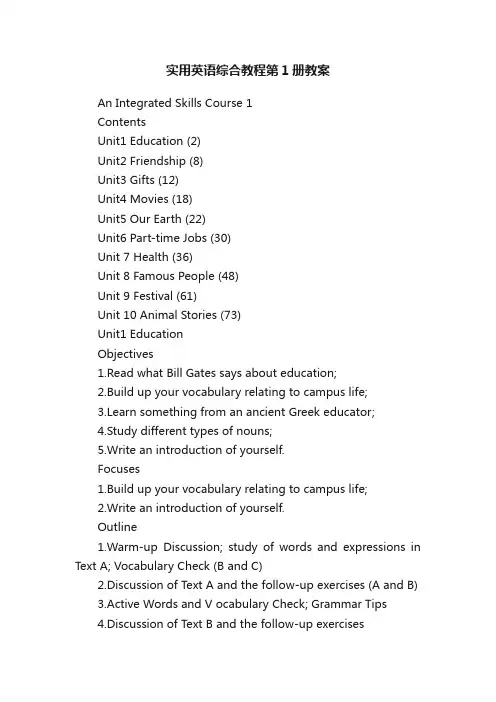
实用英语综合教程第1册教案An Integrated Skills Course 1ContentsUnit1 Education (2)Unit2 Friendship (8)Unit3 Gifts (12)Unit4 Movies (18)Unit5 Our Earth (22)Unit6 Part-time Jobs (30)Unit 7 Health (36)Unit 8 Famous People (48)Unit 9 Festival (61)Unit 10 Animal Stories (73)Unit1 EducationObjectives1.Read what Bill Gates says about education;2.Build up your vocabulary relating to campus life;3.Learn something from an ancient Greek educator;4.Study different types of nouns;5.Write an introduction of yourself.Focuses1.Build up your vocabulary relating to campus life;2.Write an introduction of yourself.Outline1.Warm-up Discussion; study of words and expressions in Text A; Vocabulary Check (B and C)2.Discussion of Text A and the follow-up exercises (A and B)3.Active Words and V ocabulary Check; Grammar Tips4.Discussion of Text B and the follow-up exercises/doc/5040d052e87101f69e31955e.html prehensive Exercises (Ask the students to do the translation exercises outside of theclass beforehand)6.Practical WritingProcedures:Classroom ActivitiesI. Warm-up discussionQuestion: Do you know anything about Bill Gates such as his life and his educational background?Hint1)birthday and birthplace: October 28, 1995; Seattle, Washington2)educational background: Harvard University (education not completed)3)career: chairmen and chief software architect of Microsoft, the word‘s largest and most profitable software company.4)main events in his life:a.beginning programming computers at age 13;b.developing a version of the programming language BASIC for the first microcomputer in Harvard;c.founding Microsoft Corporation in 1975 at the age of 19II. Vocabulary in Text A1. education n.教育e.g. Children in poor areas receive free education.educate v.教育;教导educated adj.受教育的e.g. a well-educated maneducator n.教育家,教育者2. count v.派用场,点数e.g. 1) Every seconds counts.2) What counts more is whether you have tried your best.3) to count from 1 to 1004) Count these apples.3. advantage n.有利条件,好处;优点,优势e.g. This product has many advantages.advantageous adj.有利的,有益的,便利的e.g. It is highly advantageous to us.Phrase: take advantage of 很好的使用;利用e.g. take advantage of all educational opportunitiesAntonym: disadvantage n.不利;不利条件e.g. His bad health is a great disadvantage to him when he looks for work.4. lifetime n.一生,终生e.g. 1) a lifetime guarantee2)lifetime membership3) In my father‘s lifetime there have been many changes in the village.5. part-time adj.& adv.兼职的(地)e.g. 1)a part-time job2)He works part-time.full-time adj.全职的e.g. a full-time housewife6. programmer n.程序师,编程员program v.编制程序e.g. Please program the computer to do the job instead of doing it manually(手工操作).7. discourage vt. 不鼓励;使泄气,使失去信心e.g. His parents discouraged him from joining the air force.discouraged adj. 泄气的,失去信心的discouraging adj.使人泄气的,使人失去信心的e.g. 1) If you meet difficulty in your study, don‘t be discouraged.2) It is discouraging that I didn‘t k now how to solve the problem.Antonym: encourage vt.鼓励e.g. I encouraged her to work hard and to try to pass the examinations.courage n. 勇敢,勇气e.g. David showed great courage when he saved the child from the burning house.8. diploma n. 文凭,毕业证书e.g. a college diplomadiplomatic adj. 外交的,从事外交的e.g. Julia joined the diplomatic service after her graduation from university.9. project n.项目,课题e.g. 1) an impossible project2) The professor is directing a research project.Synonym: plan10. highly adv. 高度地;非常e.g. 1) a highly interesting story2) a highly paid jobPhrase: speak/ think highly of 赞扬,对…给予很高评价e.g. The leader speaks / thinks highly of our work.11. focus v.(使)集中;(使)聚焦e.g. 1) to focus (one‘s mind) in work2) All eyes focused on the speaker.focus n.(兴趣活动等的)中心,焦点e.g. Because of his strange clothes, he immediately becamethe focus of attention when heentered the office.12. range n. 范围e.g. You have a wide range of choices.range vi.在某范围内变化e.g. The temperature ranges from 10 to 20 degrees.13. attend v.参加,出席e.g. attend schoolattend a lectureattendance n.出席,到场14. automatically adv.自动地e.g. the machine operates automatically.automatic adj.自动的e.g. We have an automatic washing machine.15. drop out of 退学,不参与,退出e.g. 1) He dropped out of school at the age of 10 because his family was too poor to afford thetuition.2) She decided to drop out of the competition because it was not fire.16. chance of a lifetime 千载难逢的良机,一生中唯一的机会e.g. It‘s the chance of a lifetime. You will regret it the rest of your lif e if you don‘t take it.17. try out 试验,考验e.g. She bought a cookbook and tried out a few new recipes.18. in short 简而言之,总之e.g. In short, you should study hard for a better future.Synonym: in brief/ to sum up/ all in all/ in conclusionIII. Language Points in Text A1.They want to know what to study, or whether it?s Ok todrop out of college since that?s what I did.what to study: This is a wh-word + infinitive structure used as the object, which can be changed into an object clause. Wh-word + infinitive structure can be used as a subject, an object, or an appositive clause(同位语从句),for example:1)How to improve their English is often discussed among the students.2)We haven‘t decided when to visit the place.3)You haven‘t answered my question about wher e to get these books.it?s Ok to drop out of college: Here ―it‖ is used as a formal subject, and the actual subject is the infinitive structure ―to drop out of college‖. The general pattern is ―It is + adj. + (for/ of + sb.) todo sth.‖ More examples:1)It was very thoughtful of her to come to see me when I was ill.2)It‘s easy for me to see through his trick.that?s what I did: ―what I did‖ here is a predictive clause (表语从句)introduced by ―what‖. It is always structured in the form of ―subject + be/ look/ remain/ seem + predictive clause‖ and can be introduced by such words as ―that‖ (always omitted), and other wh-words, for example:1) It seems (that) it is going to rain.2) This is why I refused to attend the meeting.2. As I?ve said before, nobody should drop out of college unless they believe they face the chance of a lifetime.As I?ve said before: This is a non-restrictive relative clause(非限制性关系从句) introduced by ―as‖(正如…的那样), which can be placed at the beginning or at the end of the sentence. Moreexamples:1) As people expected, she was admitted to Beijing University.2) Hundreds of people were killed in the earthquake, as I have learned from the newspaper. unless: is a conjunction for an adverbial clause of condition (条件状语从句), which equals ―if…not…‖(除非).e.g. I won‘t leave unless the rain stops.3. In my company?s early years, we have a bright part-time programmer who planned to drop out of high school to work.planned to: intend to do sth.计划、打算做某事e.g. I plan to make a trip to Beijing during the summer vocation.who planned to …work: a restrictive relative clause introduced by ―who‖ since its antecedent is a person and serves as the subject in the clause. The relative pronoun ―that‖ can be used here too. More examples:1) The young man who sits there quietly is my brother.2) I don‘t like people that pry into others‘ private business.4. Having a diploma certainly helps somebody who is looking to us for a job.look to sb./ sth.: to depend on sb. or sth. for help or advice 指望,依赖e.g. We look to you for support.5. High school and college offer you the best chance to learn many things and to do projects with others that teach you about team spirit.that teach you about team spirit: This is a restrictive relative clause introduced by ―that‖, whose antecede nt acts as the subject of the clause. Actually the relative clause introduced by ―that‖ can be used to modify both the person or the thing,and the roll of ―that‖ can be either the subject or the object.e.g. He was the only one that I knew there.I haven‘t been to the place that you have mentioned.6. In high school there was a time when I was highly focused on writing software, but for most of my high school years I had many interests.when …software: This is a relative clause introduced by the relative a dverb ―when‖, which acts as the adverbial of time in the clause.e.g. 1) There was a time when I completely lost my self-confidence.2) I will never forget those days when we were together.7. For me, classroom is not the only place where you can learn.where you can learn: This is a restrictive relative clause introduced by the relative adverb ―where‖, which is used as the adverbial of place in the clause.e.g. 1) Do you still remember the restaurant where we had dinner last night?2) This is the place where he stayed his whole life.8. In short, it?s a real mistake not to take the chance to studya wide range of subjects and to learn to work with other people because education does count.it?s a real mistake not to take the chance: This is an example of a negative infinitive structure, where ―not‖ is placed before an infinitive.e.g. 1) We are asked not to speak loudly in class.2) It is a good idea not to go out on such a rainy day.IV. Focus on Grammar名词(Noun )一、名词的概念表示人、事物或抽象概念的词叫做名词。
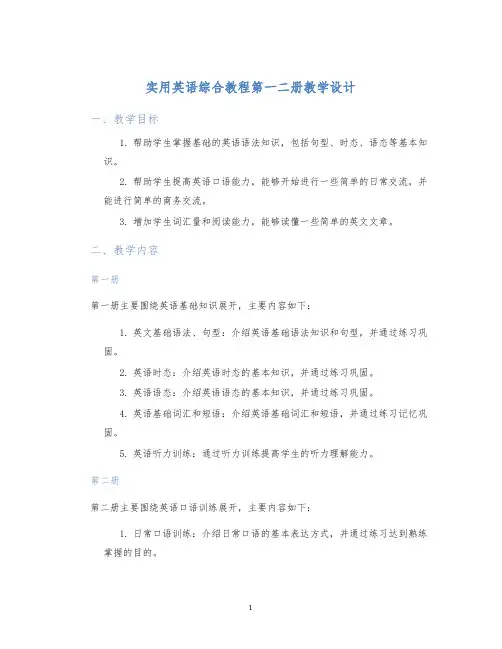
实用英语综合教程第一二册教学设计一、教学目标1.帮助学生掌握基础的英语语法知识,包括句型、时态、语态等基本知识。
2.帮助学生提高英语口语能力,能够开始进行一些简单的日常交流,并能进行简单的商务交流。
3.增加学生词汇量和阅读能力,能够读懂一些简单的英文文章。
二、教学内容第一册第一册主要围绕英语基础知识展开,主要内容如下:1.英文基础语法、句型:介绍英语基础语法知识和句型,并通过练习巩固。
2.英语时态:介绍英语时态的基本知识,并通过练习巩固。
3.英语语态:介绍英语语态的基本知识,并通过练习巩固。
4.英语基础词汇和短语:介绍英语基础词汇和短语,并通过练习记忆巩固。
5.英语听力训练:通过听力训练提高学生的听力理解能力。
第二册第二册主要围绕英语口语训练展开,主要内容如下:1.日常口语训练:介绍日常口语的基本表达方式,并通过练习达到熟练掌握的目的。
2.商务口语训练:介绍商务口语的基本表达方式,并通过模拟实践让学生逐渐掌握商务口语的应用。
3.阅读训练:介绍英文文章阅读技巧,并通过精选文章让学生进行阅读练习。
4.写作训练:介绍英语写作技巧,并通过练习帮助学生提高英语写作水平。
三、教学方法本教程将采用以下教学方法:1.课堂教学:老师上台讲解和练习巩固。
2.分组练习:将学生分成小组,进行语言交流练习。
3.个人练习:学生进行个人听力、阅读和口语训练。
4.个人作业:学生通过完成课后作业,进一步提高自己的英语能力。
四、教学评估本教程将采用以下评估方法:1.考试测试:定期组织考试,检验学生的英语能力和掌握情况。
2.作业检查:对学生的课后作业进行检查和点评。
3.口语评估:观察学生在课堂上和小组练习中的表现,进行评估。
五、总结通过本教程的学习,学生可以基本掌握英语基础语法知识,提高英语口语、阅读和写作能力。
此外,通过小组练习和个人练习,学生不仅可以增加语言实践经验,更能在参与讨论和交流中不断提高自己的口语流利度和思维能力,为将来的英语学习和职场发展奠定基础。
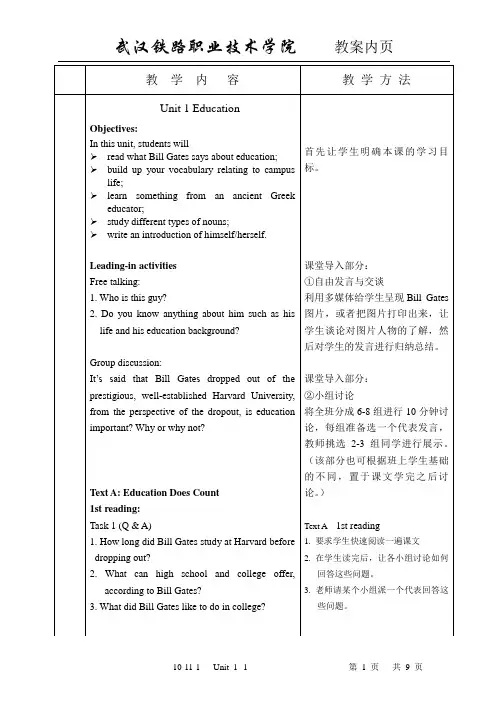
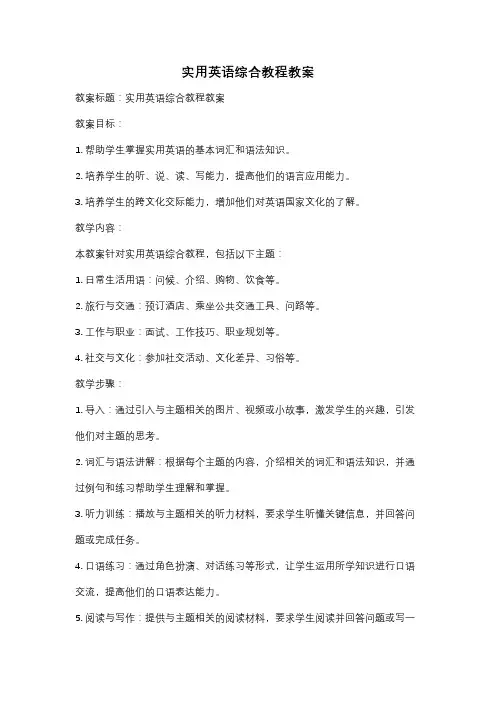
实用英语综合教程教案教案标题:实用英语综合教程教案教案目标:1. 帮助学生掌握实用英语的基本词汇和语法知识。
2. 培养学生的听、说、读、写能力,提高他们的语言应用能力。
3. 培养学生的跨文化交际能力,增加他们对英语国家文化的了解。
教学内容:本教案针对实用英语综合教程,包括以下主题:1. 日常生活用语:问候、介绍、购物、饮食等。
2. 旅行与交通:预订酒店、乘坐公共交通工具、问路等。
3. 工作与职业:面试、工作技巧、职业规划等。
4. 社交与文化:参加社交活动、文化差异、习俗等。
教学步骤:1. 导入:通过引入与主题相关的图片、视频或小故事,激发学生的兴趣,引发他们对主题的思考。
2. 词汇与语法讲解:根据每个主题的内容,介绍相关的词汇和语法知识,并通过例句和练习帮助学生理解和掌握。
3. 听力训练:播放与主题相关的听力材料,要求学生听懂关键信息,并回答问题或完成任务。
4. 口语练习:通过角色扮演、对话练习等形式,让学生运用所学知识进行口语交流,提高他们的口语表达能力。
5. 阅读与写作:提供与主题相关的阅读材料,要求学生阅读并回答问题或写一篇短文,锻炼他们的阅读理解和写作能力。
6. 文化交流:通过介绍英语国家的文化习俗、音乐、电影等,增加学生对英语国家文化的了解,培养他们的跨文化交际能力。
7. 综合练习:设计综合性的练习,包括听、说、读、写等多个方面,让学生综合运用所学知识,提高他们的语言应用能力。
8. 总结与反馈:对本节课的学习进行总结,并给予学生反馈,鼓励他们的努力并指出需要改进的地方。
教学评估:1. 课堂表现:观察学生在课堂上的参与度、表达能力和合作精神。
2. 作业评估:批改学生的书面作业,评估他们的语法和写作能力。
3. 测验:设计与教学内容相关的听力、口语、阅读和写作测验,评估学生的综合语言能力。
教学资源:1. 教材:实用英语综合教程教材及配套练习册。
2. 多媒体设备:投影仪、音响设备等,用于播放听力材料和展示教学资源。
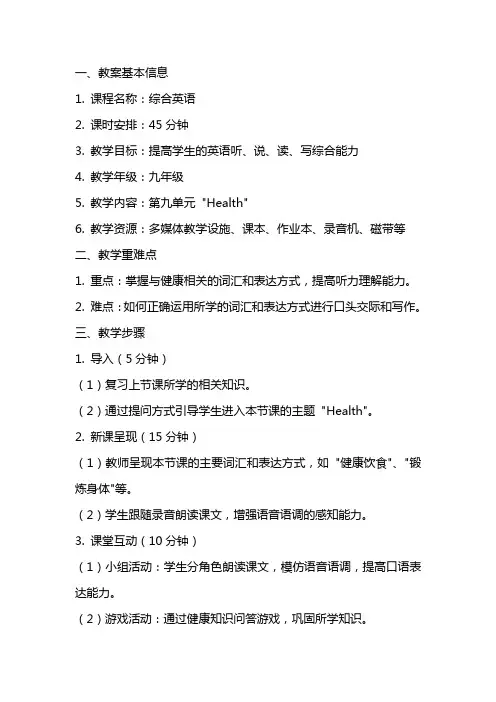
一、教案基本信息1. 课程名称:综合英语2. 课时安排:45分钟3. 教学目标:提高学生的英语听、说、读、写综合能力4. 教学年级:九年级5. 教学内容:第九单元"Health"6. 教学资源:多媒体教学设施、课本、作业本、录音机、磁带等二、教学重难点1. 重点:掌握与健康相关的词汇和表达方式,提高听力理解能力。
2. 难点:如何正确运用所学的词汇和表达方式进行口头交际和写作。
三、教学步骤1. 导入(5分钟)(1)复习上节课所学的相关知识。
(2)通过提问方式引导学生进入本节课的主题"Health"。
2. 新课呈现(15分钟)(1)教师呈现本节课的主要词汇和表达方式,如"健康饮食"、"锻炼身体"等。
(2)学生跟随录音朗读课文,增强语音语调的感知能力。
3. 课堂互动(10分钟)(1)小组活动:学生分角色朗读课文,模仿语音语调,提高口语表达能力。
(2)游戏活动:通过健康知识问答游戏,巩固所学知识。
4. 作业布置(5分钟)(1)课后作业:完成课本配套练习题,巩固所学知识。
(2)拓展作业:调查家人或朋友的健康习惯,并用英语进行简要汇报。
四、课后反思(5分钟)教师对本节课的教学效果进行自我评价,找出不足之处,为下一节课的教学做好准备。
五、教学评价1. 学生课堂参与度:观察学生在课堂上的发言和互动情况,了解学生的学习积极性。
2. 学生作业完成情况:检查课后作业,评估学生的学习效果。
3. 学生单元测试成绩:通过单元测试,检验学生的综合运用能力。
六、教学评价方式1. 口语表达:评估学生在课堂互动中的口语表达流利程度、准确性和语音语调。
2. 听力理解:通过课后练习和课堂小测试,检测学生对听力材料的理解程度。
3. 阅读理解:评估学生对课文内容的理解和分析能力,以及词汇的运用。
4. 写作能力:通过课后作业和课堂练习,评价学生的写作技巧和语言组织能力。
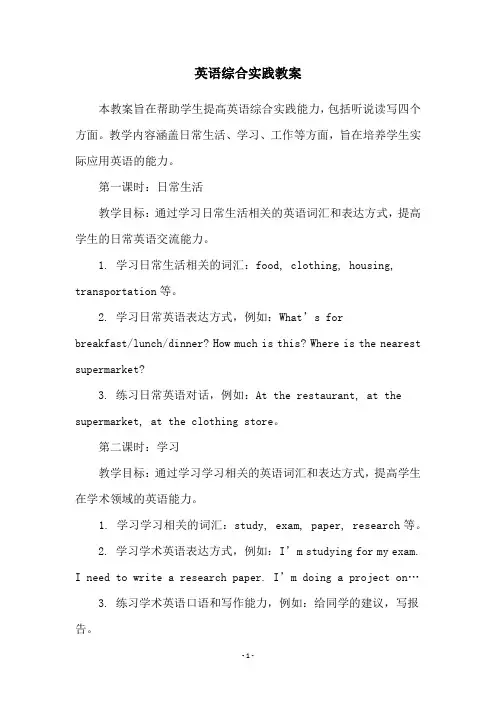
英语综合实践教案本教案旨在帮助学生提高英语综合实践能力,包括听说读写四个方面。
教学内容涵盖日常生活、学习、工作等方面,旨在培养学生实际应用英语的能力。
第一课时:日常生活教学目标:通过学习日常生活相关的英语词汇和表达方式,提高学生的日常英语交流能力。
1. 学习日常生活相关的词汇:food, clothing, housing, transportation等。
2. 学习日常英语表达方式,例如:What’s forbreakfast/lunch/dinner? How much is this? Where is the nearest supermarket?3. 练习日常英语对话,例如:At the restaurant, at the supermarket, at the clothing store。
第二课时:学习教学目标:通过学习学习相关的英语词汇和表达方式,提高学生在学术领域的英语能力。
1. 学习学习相关的词汇:study, exam, paper, research等。
2. 学习学术英语表达方式,例如:I’m studying for my exam.I need to write a research paper. I’m doing a project on…3. 练习学术英语口语和写作能力,例如:给同学的建议,写报告。
第三课时:工作教学目标:通过学习工作相关的英语词汇和表达方式,提高学生在职场的英语能力。
1. 学习工作相关的词汇:job, interview, resume, deadline 等。
2. 学习职场英语表达方式,例如:I have an interview tomorrow.I need to update my resume. What’s the deadline for this project?3. 练习职场英语交流能力,例如:模拟面试,写求职信。
第四课时:文化教学目标:通过学习文化相关的英语词汇和表达方式,提高学生对英语国家文化的认识。
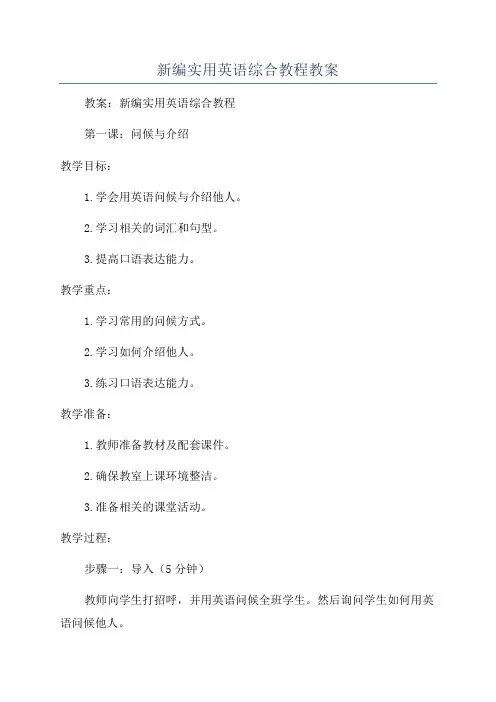
新编实用英语综合教程教案教案:新编实用英语综合教程第一课:问候与介绍教学目标:1.学会用英语问候与介绍他人。
2.学习相关的词汇和句型。
3.提高口语表达能力。
教学重点:1.学习常用的问候方式。
2.学习如何介绍他人。
3.练习口语表达能力。
教学准备:1.教师准备教材及配套课件。
2.确保教室上课环境整洁。
3.准备相关的课堂活动。
教学过程:步骤一:导入(5分钟)教师向学生打招呼,并用英语问候全班学生。
然后询问学生如何用英语问候他人。
步骤二:新知呈现(10分钟)教师提供一些常用的问候方式,并解释其用法和含义。
例如:“How are you?”、“What’s up?”、“How’s it going?”等。
然后教师通过演示的方式向学生展示如何用这些问候方式与他人进行交流。
步骤三:对话练习(10分钟)教师分发练习卡片,学生们分成小组进行对话练习。
每组学生轮流扮演不同的角色,进行问候和介绍的对话练习。
教师可以在课堂辅助学生,纠正他们的发音和语法错误。
步骤四:分组活动(15分钟)教师将学生分成小组,每个小组的成员都有一个袋子,里面放有一些物品。
小组成员通过轮流拿东西,然后用自己的话介绍拿到的物品。
其他组员可以提问或者给出评论。
教师可以在活动过程中引导学生使用相关的句型和表达方式。
步骤五:练习评价(10分钟)教师提供一些练习题,要求学生用英语回答。
例如:“How do you usually greet your friends?”、“How would you introduce yourself in English?”等。
学生们可以在书写或者口头表达上回答问题。
步骤六:小结复习(5分钟)教师对本节课的内容做一个小结,并提醒学生下节课的学习内容。
第二课:购物与点餐教学目标:1.学会用英语购物和点餐。
2.学习相关的词汇和句型。
3.提高口语表达能力。
教学重点:1.学习如何用英语购物和点餐。
2.学习相关的词汇和句型。
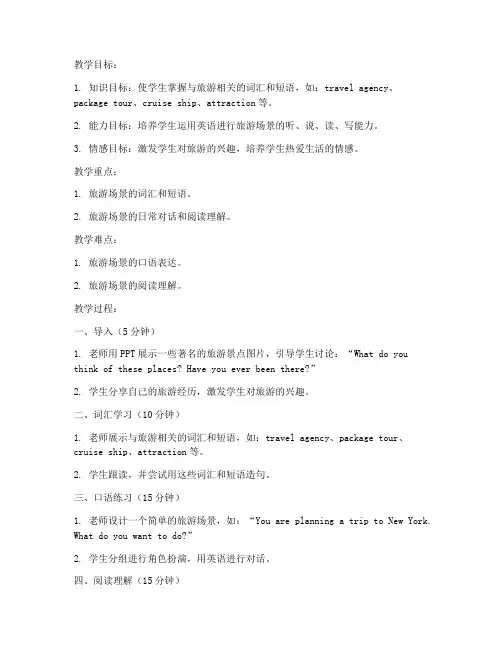
教学目标:1. 知识目标:使学生掌握与旅游相关的词汇和短语,如:travel agency、package tour、cruise ship、attraction等。
2. 能力目标:培养学生运用英语进行旅游场景的听、说、读、写能力。
3. 情感目标:激发学生对旅游的兴趣,培养学生热爱生活的情感。
教学重点:1. 旅游场景的词汇和短语。
2. 旅游场景的日常对话和阅读理解。
教学难点:1. 旅游场景的口语表达。
2. 旅游场景的阅读理解。
教学过程:一、导入(5分钟)1. 老师用PPT展示一些著名的旅游景点图片,引导学生讨论:“What do youthink of these places? Have you ever been there?”2. 学生分享自己的旅游经历,激发学生对旅游的兴趣。
二、词汇学习(10分钟)1. 老师展示与旅游相关的词汇和短语,如:travel agency、package tour、cruise ship、attraction等。
2. 学生跟读,并尝试用这些词汇和短语造句。
三、口语练习(15分钟)1. 老师设计一个简单的旅游场景,如:“You are planning a trip to New York. What do you want to do?”2. 学生分组进行角色扮演,用英语进行对话。
四、阅读理解(15分钟)1. 老师分发课文,让学生阅读并完成课后练习。
2. 老师讲解课文中的难点,如:旅游相关的词汇和短语、旅游场景的日常对话等。
五、写作练习(10分钟)1. 老师布置写作任务:写一篇关于自己旅游经历的短文。
2. 学生根据提示,用英语进行写作。
六、课堂小结(5分钟)1. 老师总结本节课所学内容,强调重点和难点。
2. 学生分享自己的学习心得。
七、课后作业1. 复习课文,巩固所学词汇和短语。
2. 完成课后练习,提高阅读理解能力。
3. 根据写作任务,写一篇关于自己旅游经历的短文。
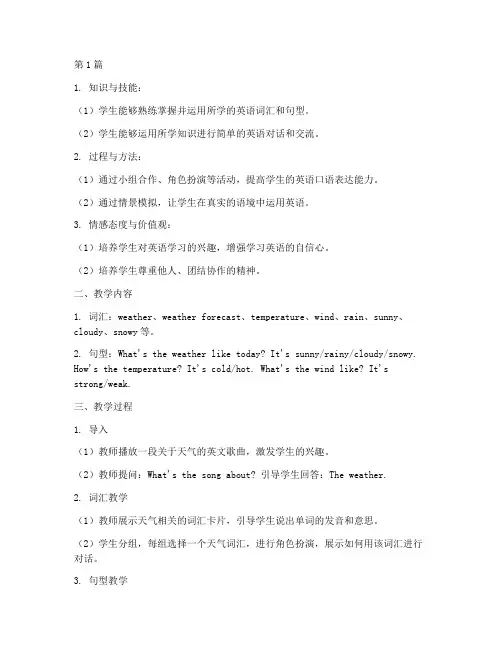
第1篇1. 知识与技能:(1)学生能够熟练掌握并运用所学的英语词汇和句型。
(2)学生能够运用所学知识进行简单的英语对话和交流。
2. 过程与方法:(1)通过小组合作、角色扮演等活动,提高学生的英语口语表达能力。
(2)通过情景模拟,让学生在真实的语境中运用英语。
3. 情感态度与价值观:(1)培养学生对英语学习的兴趣,增强学习英语的自信心。
(2)培养学生尊重他人、团结协作的精神。
二、教学内容1. 词汇:weather、weather forecast、temperature、wind、rain、sunny、cloudy、snowy等。
2. 句型:What's the weather like today? It's sunny/rainy/cloudy/snowy. How's the temperature? It's cold/hot. What's the wind like? It's strong/weak.三、教学过程1. 导入(1)教师播放一段关于天气的英文歌曲,激发学生的兴趣。
(2)教师提问:What's the song about? 引导学生回答:The weather.2. 词汇教学(1)教师展示天气相关的词汇卡片,引导学生说出单词的发音和意思。
(2)学生分组,每组选择一个天气词汇,进行角色扮演,展示如何用该词汇进行对话。
3. 句型教学(1)教师展示句型卡片,引导学生说出句子的意思和用法。
(2)学生分组,每组选择一个句型,进行角色扮演,展示如何运用句型进行对话。
4. 情景模拟(1)教师创设一个关于天气的情景,如:Today is Saturday. It's sunny. What are you going to do? 引导学生运用所学知识进行对话。
(2)学生分组,每组根据教师提供的情景,进行角色扮演,展示如何运用所学知识进行对话。
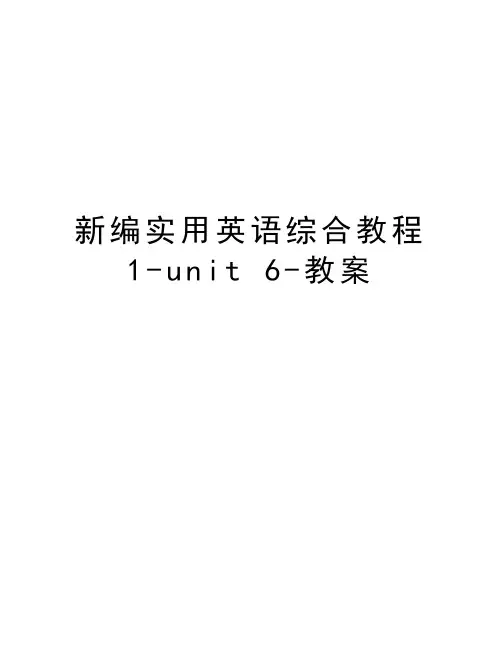
新编实用英语综合教程1-u n i t6-教案
用心整理的精品word文档,下载即可编辑!!
教案首页
精心整理,用心做精品1
用心整理的精品word文档,下载即可编辑!!
课堂组织
教案内容
精心整理,用心做精品2
用心整理的精品word文档,下载即可编辑!!
精心整理,用心做精品3
用心整理的精品word文档,下载即可编辑!!
精心整理,用心做精品4
用心整理的精品word文档,下载即可编辑!!
教案首页
精心整理,用心做精品5
用心整理的精品word文档,下载即可编辑!!
课堂组织
精心整理,用心做精品6
用心整理的精品word文档,下载即可编辑!!
教案内容
精心整理,用心做精品7
用心整理的精品word文档,下载即可编辑!!
精心整理,用心做精品8
用心整理的精品word文档,下载即可编辑!!
精心整理,用心做精品9
教案首页
课堂组织
教案内容
教案首页
课堂组织
教案内容。
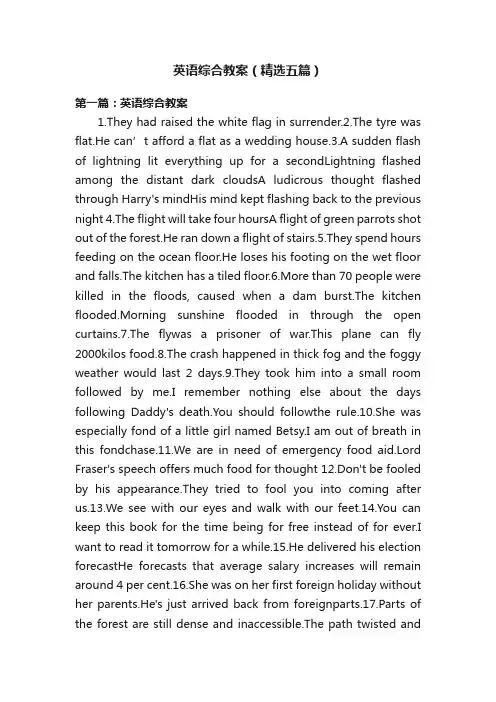
英语综合教案(精选五篇)第一篇:英语综合教案1.They had raised the white flag in surrender.2.The tyre was flat.He can’t afford a flat as a wedding house.3.A sudden flash of lightning lit everything up for a secondLightning flashed among the distant dark cloudsA ludicrous thought flashed through Harry's mindHis mind kept flashing back to the previous night4.The flight will take four hoursA flight of green parrots shot out of the forest.He ran down a flight of stairs.5.They spend hours feeding on the ocean floor.He loses his footing on the wet floor and falls.The kitchen has a tiled floor.6.More than 70 people were killed in the floods, caused when a dam burst.The kitchen flooded.Morning sunshine flooded in through the open curtains.7.The flywas a prisoner of war.This plane can fly 2000kilos food.8.The crash happened in thick fog and the foggy weather would last 2 days.9.They took him into a small room followed by me.I remember nothing else about the days following Daddy's death.You should followthe rule.10.She was especially fond of a little girl named Betsy.I am out of breath in this fondchase.11.We are in need of emergency food aid.Lord Fraser's speech offers much food for thought 12.Don't be fooled by his appearance.They tried to fool you into coming after us.13.We see with our eyes and walk with our feet.14.You can keep this book for the time being for free instead of for ever.I want to read it tomorrow for a while.15.He delivered his election forecastHe forecasts that average salary increases will remain around 4 per cent.16.She was on her first foreign holiday without her parents.He's just arrived back from foreignparts.17.Parts of the forest are still dense and inaccessible.The path twisted andturned through the forest.18.She forgot where she left the car and it took us two days to find it.I hope you will forget about the bad experience you had today.19.There is a sharp point on a forkor pitchfork.20.They received a benefit in the form of a tax reduction...A queue forms outside Peter's study...She thought she'd never been so glad to see his bulky form.You will be asked to fill in a form with details of your birth and occupation.21.She fell forwards on to her face.People should forget and look forwardsThree policeman step forwardand raise their rifles.I'll take the right forwardzone.Please move your car forward.22.A fountain is an ornamental feature in a pool or lake which consists of a long narrow stream of water that is forced up into the air by a pump.Ancient greece was a fountainof wisdom and philosophy.23.We followed the fox's tracks and caught it.24.The elections were free and fair...There was hardly any freetime.We get Freeupgrades and technical supportAppointment booking services are freeof charge.He wa kind and set the hare free so that it got freedom.25.If the temperature drops below 0°C, water freezes.You can freeze the soup at this stageWhat if it rained and then froze all through those months?Code freezefive minutes before end of contest.It is cold and the temprerature has dropped to the freezing point.26.Fresh food has been picked or produced recently, and has not been preserved, for example by being frozen or put in a tinThe morning freshair makes me feel quit frisky.They bring a fresh point.27.I have been fixing the fridgeall the morning.Anything moldy in the fridge?28.Friendship the older it grows the stronger it is..We are not friendly to foreigners.29.We are frightened to hear the frightening sound.30.From then on ,the enemies searched me from door to door.They live from door to door.31.Stand at thefront of the lineShe was only six and still missing her front teeth.The Guardian's front page carries a photograph of the two foreign ministers.Sonja's husband is fighting at the front.32.It was bitterly cold now and the ground was frozen hard.Frozen fish is a very healthy convenience food 33.Like tree,like fruit.Action is the proper fruit of knowledge.34.Fry the breadcrumbs until golden brown.She cuts and fries the mixture up into a potato doughnut called Quin-Kuria.35.They ran out of fuel and the car stopped.36.Reading makes a full man.Once the container is full, it stays shut until you turn it clockwise.I feel full of confidence and so open to possibilities.The main car park was full when I left about 10.45.People would go into the store and come out with their arms full.37.It was such a success and we had so much fun doing it.It could be fun to watch themLiz was wonderful fun to be with.38.I'll tell you a funny story.Children get some very funny ideas sometimes!.39.Each piece of furniture in their home suited the style of the house.This furniturebelonged to him.40.He was making plans for the future...There's no future in this relationship. 第二篇:综合英语III教案课程名称:综合英语III课程代码:开课系部:外语系授课教师:授课班级: XX级英语本科班开课学期: 201X-201X第一学期教案一、课程简介课程类别:专业必修课授课对象:本科英语专业学时学分:68学时;学分2分使用教材:杨立民,《现代大学英语》,外语教学与研究出版社,2011年。
实用综合教程教案Unit 1-5教案编写日期:2024年10月教案编辑专员:一、教学目标1.1 知识目标学生能够掌握日常生活中常用的单词和短语。
学生能够理解并运用简单的语法结构进行日常交流。
1.2 技能目标学生能够听懂并能够使用日常会话中的基本句型。
学生能够在适当的语境中正确使用所学的单词和短语。
1.3 情感目标培养学生对英语学习的兴趣,增强学习动力。
培养学生勇于开口表达的信心和勇气。
二、教学内容2.1 主题内容本单元主要围绕日常生活中的人际交往展开,包括介绍自己、询问他人信息、表达喜好等场景。
2.2 语言点本单元重点学习一般现在时态的肯定句和疑问句。
本单元学习常用的日常会话句型,如:How are you? I'm fine, thank you. What's your name? My name is等。
三、教学方法3.1 情境教学法通过设置各种生活情境,让学生在实际语境中学习和使用英语。
3.2 交际法鼓励学生进行角色扮演,进行实际的语言交流。
3.3 任务型教学法通过完成各种小组任务,培养学生的合作精神和语言运用能力。
四、教学步骤4.1 热身活动(5分钟)教师与学生进行简单的英语问候,营造轻松的课堂氛围。
4.2 新课导入(10分钟)教师通过图片、实物等展示本节课的主题,引入新词汇和句型。
4.3 课堂讲解(15分钟)教师讲解本节课的重点词汇和句型,让学生进行实际操作练习。
4.4 小组活动(15分钟)学生分组进行角色扮演,运用所学词汇和句型进行实际交流。
4.5 总结与作业布置(5分钟)教师对本节课的内容进行总结,布置相关作业,巩固所学知识。
五、教学评价5.1 课堂参与度观察学生在课堂上的积极参与程度,以及对课堂活动的兴趣。
5.2 语言运用能力评估学生在角色扮演等实际交流活动中的语言运用能力。
5.3 作业完成情况检查学生作业的完成质量,以巩固所学知识。
六、教学资源6.1 教材:实用综合教程教材6.2 辅助材料:多媒体课件、图片、实物等6.3 教学工具:投影仪、计算机、黑板等七、教学评估7.1 形成性评估教师在教学过程中观察学生的学习情况,及时进行反馈和指导。
综合英语教案一、教学目标1.知识目标:掌握本单元的重点词汇和短语,理解课文内容,了解相关的文化背景。
2.能力目标:培养学生的阅读理解能力、听力理解能力、口语表达能力和写作能力。
3.情感目标:培养学生的跨文化意识,提高对英语学习的兴趣和积极性。
二、教学内容本单元主要围绕“旅行”这一主题展开,包括阅读、听力、口语和写作四个部分。
三、教学步骤1.导入(5分钟)通过展示一些关于旅行的图片或视频,引导学生进入本单元的主题。
提出问题,让学生思考旅行的好处和意义,激发学生的学习兴趣。
2.阅读(20分钟)让学生阅读本单元的课文,了解文章的主要内容和结构。
在阅读过程中,引导学生注意重点词汇和短语的用法,以及文章中的文化背景知识。
同时,鼓励学生提出问题和疑惑,及时解答学生的问题。
3.听力(10分钟)播放本单元的听力材料,让学生了解听力内容。
在播放过程中,引导学生注意听力技巧和方法的运用,如抓住关键词、预测答案等。
同时,鼓励学生多听多练,提高听力水平。
4.口语(15分钟)组织学生进行口语练习,围绕“旅行”这一主题展开讨论。
让学生分组进行对话练习,鼓励学生运用所学词汇和短语进行交流和表达。
同时,引导学生注意语音语调的准确性和流利性。
5.写作(10分钟)让学生根据本单元的主题和所学知识,写一篇关于旅行的短文。
在写作过程中,引导学生注意文章的结构和逻辑性,以及语言的准确性和流畅性。
同时,鼓励学生多写多练,提高写作水平。
6.总结与作业(5分钟)对本节课的教学内容进行总结,强调重点和难点。
布置相关作业,让学生课后继续巩固所学知识。
同时,鼓励学生多阅读、多听、多说、多写,提高英语综合应用能力。
综合英语教案教学目标:1. 提高学生在听、说、读、写等综合能力方面的表现。
2. 培养学生良好的英语学习习惯和自学能力。
3. 帮助学生构建英语知识体系,提升语言运用能力。
教学内容:本教学计划主要包括听力、口语、阅读和写作等方面的内容。
听力: 学习认知常见场景中的英语表达,并能理解其意思。
口语: 练习课堂用语、社交用语等,提高口语表达能力。
阅读: 阅读各类文本,并能理解文中信息,提取关键信息。
写作: 学习书写英文摘要、邮件、短文等,提高写作能力。
教学步骤:Step 1: 听力训练通过听力材料,学生能够提升对英语语音的敏感度和理解力。
教师可选取各类听力材料,如短对话、录音新闻、听力练习等。
学生先进行预测猜测,然后认真聆听,最后填写相关问题或回答问题。
Step 2: 口语训练通过多种口语练习,学生能够提高口语表达和交流能力。
教师可以引导学生在小组内进行对话练习,模拟日常交际情景,如问路、点餐、购物等。
同时,教师可设定课堂用语积极引导学生熟练掌握英语课堂常用语。
Step 3: 阅读训练通过阅读材料,学生能够提升对英文短文的理解和阅读能力。
教师可选取适合学生水平的短文,让学生独立阅读,并回答相关问题或做理解练习。
教师还可引导学生进行阅读技巧的训练,如快速浏览、精读理解等。
Step 4: 写作训练通过写作练习,学生能够提升英文写作能力和写作表达能力。
教师可布置写作任务,如写邮件、写摘要、写短文等。
学生在写作过程中要注意使用适当的语法、词汇和句式,同时也要注重提高篇章结构和逻辑性。
Step 5: 反馈与评价教师对学生的听力、口语、阅读和写作等能力进行及时反馈,并给予积极的评价。
同时,教师可根据学生的表现和进步情况,调整教学方法和教学内容,帮助学生更好地提高综合英语能力。
教学资源:1. 听力材料:录音机、听力练习材料等。
2. 口语练习:教师设计的对话练习题、口语情景卡片、课堂用语卡片等。
3. 阅读材料:英文短文、英语阅读教材等。
新编实用英语综合教程1教案Lesson Plan for New Practical English Comprehensive Course 1。
Objective:Introduce students to the basic principles of English pronunciation and grammar.Develop students' reading, writing, speaking, and listening skills.Increase students' vocabulary and cultural awareness.Materials:Textbook: New Practical English Comprehensive Course 1。
Whiteboard or chart paper.Markers.Audio-visual aids (optional)。
Procedure:1. Warm-up (5 minutes)。
Greet students and lead them in a few simple icebreakers to get them talking in English.Examples:Good morning/afternoon, class.How are you today?What is your name?2. Introduction (10 minutes)。
Explain the objective of the lesson and the importanceof learning English.Provide a brief overview of the topics covered in the textbook.Ask students to share their prior knowledge of English or any experiences they have had with the language.3. Lesson Development (45 minutes)。
教学对象:大学英语专业学生教学目标:1. 提高学生的英语听、说、读、写综合能力。
2. 培养学生的英语思维能力和跨文化交际能力。
3. 增强学生的自主学习能力和团队合作精神。
教学内容:1. 英语听力:包括日常对话、新闻、讲座等。
2. 英语口语:包括日常交流、辩论、演讲等。
3. 英语阅读:包括文章、小说、报刊等。
4. 英语写作:包括议论文、说明文、应用文等。
教学过程:一、导入(5分钟)1. 教师简要介绍本节课的学习目标和内容。
2. 学生进行自由讨论,分享自己对英语学习的看法和经验。
二、听力训练(15分钟)1. 学生听一段英语对话或新闻,教师提问相关问题,检查学生的听力理解能力。
2. 学生分组讨论,分享自己的听力心得。
三、口语练习(15分钟)1. 学生进行角色扮演,模拟日常生活中的场景,如购物、旅行、求职等。
2. 教师巡回指导,纠正学生的发音、语法和语调等问题。
四、阅读理解(20分钟)1. 学生阅读一篇英语文章,教师提问相关问题,检查学生的阅读理解能力。
2. 学生分组讨论,分享自己的阅读心得。
五、写作训练(15分钟)1. 学生根据教师给出的题目,进行英语写作练习。
2. 教师挑选部分学生的作文进行点评,指出优点和不足。
六、总结与反思(5分钟)1. 教师对本节课的学习内容进行总结,强调重点和难点。
2. 学生分享自己的学习心得,提出改进意见。
教学评价:1. 学生对英语听、说、读、写各项技能的掌握程度。
2. 学生在课堂上的参与度和积极性。
3. 学生对英语学习的兴趣和自信心。
教学反思:1. 教师应根据学生的实际情况,调整教学内容和方法。
2. 加强学生的口语和写作训练,提高学生的实际应用能力。
3. 注重培养学生的自主学习能力和团队合作精神,提高课堂效率。
教学资源:1. 英语教材、听力材料、口语材料、阅读材料、写作练习题等。
2. 多媒体设备,如电脑、投影仪等。
教学时长:2课时。
一、课程名称:大学《综合英语》二、授课班级:XX班三、授课时间:第XX周四、教学目标:1. 知识目标:掌握基本的英语语法、词汇和句型,提高英语听说读写能力。
2. 能力目标:培养学生运用英语进行交际的能力,提高学生的思辨能力和跨文化交际能力。
3. 情感目标:激发学生对英语学习的兴趣,培养学生积极向上的学习态度。
五、教学内容:1. 课文内容:本节课主要学习Unit XX的课文内容,包括对话、短文和阅读材料。
2. 语法点:复习和巩固本单元的语法知识点,如时态、语态、非谓语动词等。
3. 词汇:学习并掌握本单元的生词和短语,扩大词汇量。
4. 听力:提高学生的听力理解能力,学会捕捉关键信息。
5. 口语:训练学生的口语表达能力,提高学生的交际能力。
六、教学过程:(一)导入新课1. 通过播放与本节课主题相关的视频或图片,激发学生的学习兴趣。
2. 引导学生回顾上一节课所学内容,为新课的导入做好铺垫。
(二)新课导入1. 介绍本节课的学习目标和要求。
2. 播放课文录音,让学生初步了解课文内容。
(三)课文讲解1. 针对课文中的重点词汇、句型和语法点进行讲解,帮助学生理解和掌握。
2. 引导学生分析课文结构,提高学生的阅读理解能力。
(四)听力训练1. 播放与本节课主题相关的听力材料,让学生练习听力理解。
2. 针对听力材料中的关键信息进行提问,检验学生的听力效果。
(五)口语练习1. 分组进行口语练习,让学生运用所学知识进行对话和讨论。
2. 教师巡回指导,纠正学生的发音和语法错误。
(六)语法练习1. 布置语法练习题,让学生巩固所学语法知识点。
2. 教师讲解练习题中的难点,帮助学生理解和掌握。
(七)小结与作业布置1. 总结本节课的学习内容,强调重点和难点。
2. 布置课后作业,包括课文背诵、语法练习、口语练习等。
七、教学评价:1. 课堂参与度:观察学生在课堂上的表现,评价其学习态度和积极性。
2. 作业完成情况:检查学生的课后作业,评价其学习效果。
第一单元I. Warm-up activities1.Pre-reading activities (Questions and answers)1.-Why was Gaston‟s friend, Gouvernail, stayin g at the plantation?Because he was exhausted and run down by too much work, and he came here just to seek a short rest from over work.2.-What did Mrs. Baroda think of Gouvernail?At first, in the eyes of Mrs. Baroda, Gouvernail, puzzling and boring, was far from a man of wit as her husband used to tell her. But one night on her plantation, her conversation with him changed her attitude toward him from dislike to desire for an intimacy with him.3.-Why did Mrs. Baroda leave the plantation?Mrs. Baroda chose to leave the plantation, because Mrs. Baroda was surprised and shocked to feel a strong temptation and desire her husband‟s friend created in her, and, as a respectable married woman, she did not want that temptation to go out of control.2.TemptationNow that temptation has found its way into every facet of our life and no one is immune to its attacks, it is wise of us to get to its root. In general, temptation stems from three major sources: lust for sensual pleasures, desire for material comfort and zeal for domination of others. As seen in extreme cases, burning thirst for sensual enjoyment tempts you to drain yourself of every shame; undue hunger for material wealth leads you to deprive your life of anything more vital than money; and unbridled ambition for power drives you to stop at nothing in climbing to it. So it can be concluded that none of us can escape from the clutches of temptation, just as no one can take firein his/her bosom without his clothes being burned. The problem is how to prevent such a fire from running wild in our hearts. My way out of its clutches is to map out in mind a set of principles as a guide to every conduct in life. Then all that needs to be done is to act upon the principles of conduct, within which boundaries, for example, beauty, no matter how alluring, is not for abuse but for appreciation. In sum, if we remain as true to our principles as ever, temptation can do nothing with us.II. Drills of important phrases in the text1. 得知······而不快/高兴/惊讶/痛心be annoyed/delighted/surprised/distressed to learn that (L. 1)2. 和以前一样不了解某人understand sb. no better than at first (L. 4)3. 执意陪伴着他impose her company upon him (L. 6)4. 试图做某事press one‟s attempt to do sth. (L. 6)5. 就我而言for my part (L. 9)6. 没有给某人添麻烦give sb. no trouble (L. 11)7. 为某事做一些安排plan somewhat for sth. (L. 12) 8. 让人吃惊be full of surprises (L. 17) 9. 料想;指望count upon (L. 18) 10. 认真对待某人/某事take sb./sth. seriously (L. 20)11. 对······大惊小怪make a fuss about… (L. 20)12. 某人最不希望的事情the last thing sb. would desire or expect (L. 21)13. (使)筋疲力尽run down (L. 24)14. 明确感觉有必要做某事the feeling of a distinct necessity to do sth. (L. 32)15. 丝毫不曾怀疑······without a suspicion/doubt that… (L. 35)16. 反对某事object to sth. (L. 35) 17. 陶醉于······drink in… (L. 51)18. 很想做某事be greatly tempted to do sth. (L. 57)19. 没有抵挡住诱惑yield to the temptation (L. 58)20. 从她家中离开be gone from under her roof (L. 24)III. Organization of the text (main idea, developing devices)1.Main idea of the textAt fir st, Mrs. Baroda didn‟t like her husband‟s friend, Gouvernail, whom she found far from a man of wit but a dull man hard to read. One night, however, a conversation between them opened up and revealed his true personality, which proved to be a strong temptation to her, a respectablewoman. But in the end, she withstood and overcame that temptation.2.How is the text organized?This reading passage is made up of several episodes organized according to time sequence, with the episodes centered on the narration, through cause-and-effect, of the changes in Mrs. Baroda‟s emotion and attitude concerning her husband‟s friend, Gouvernail. The whole process undergoes several distinct stages.-Mrs. Baroda‟s strong dislike for the man Paras. 1-10-Her inner desire to get close to the man Paras. 11-18-Her sensible resolve to move away from him Paras. 19-20-Her further struggle against the temptation Para. 21-Victory of her reason over the temptation Paras. 22-243.Text analysisPart 1: Para 1-2 Main idea : Mrs. Baroda‟s annoyance to have her husband‟s friend at her home. Part 2: Para 3-10 Main idea: The talk between Mr. And Mrs. Baroda about Gouvernail.Part 3: Para 11-18 Main idea: The emotional change of Mrs. Baroda towards Gouvernail.Part 4: Para 19-20 Mai n idea: Mrs. Baroda‟s leaving home early the next morning.Part 5: Para 21-24 Main idea: Mrs. Baroda‟s change of attitudes towards inviting Gouvernail to revisit them.IV. key words and expressionsA. Expressions1.Mrs. Baroda was a little annoyed to learn …be a little annoyed to do …做…有点恼火(= be a bit angry to do …)eg:---- He was a little annoyed to lose such a chance.---- I was a bit annoyed, for I forgot to put your name on. 我忘了把你的名字添上去,我感到有点恼火。